#John Dean revealed *cancer on the presidency* of Richard Nixon
Link
+ The Justice Department secretly seizing smartphone data of Democrats on the House Intelligence Committee is “Nixon on stilts and steroids,” a former White House counsel said Friday (6-11-2021).
+ John Dean, who served as counsel during the administration of Richard Nixon before flipping on the then-president over the Watergate scandal, told CNN’s Erin Burnett that the actions of former pres-ident Donald Tr*mp’s DOJ went far beyond what his former boss ever did.
+ “Nixon didn’t have that kind of Department of Justice,” Dean said. He then recalled how the Nixon administration responded to the Pentagon Papers — classified documents detailing U.S. involvement in the Vietnam War — being leaked.
+ “I got a call from the Oval Office the day after he learned that, and could the Department of Justice bring a criminal action for this? Called over, found out the short answer was they could, but they won’t,” Dean said. “So Nixon couldn’t use the department as he wanted to.”
+ Burnett asked Dean if the Tr*mp DOJ’s actions went “beyond what Nixon did.”
+ “It is beyond Nixon, yes,” Dean responded. “It’s Nixon on stilts and steroids.”
#John Dean the WH counsel under Richard Nixon#John Dean the Watergate cover-up whistleblower#John Dean revealed *cancer on the presidency* of Richard Nixon#Richard Nixon disgraced ex-US president#Richard Nixon resigned US presidency in disgrace#Tr*mp DOJ targeted Dems’ electronic files#Tr*mp DOJ secretly subpoenaed Dems’ electronic records#John Dean calls Tr*mp abuses *Nixon on stilts & steroids*#John Dean the White House counsel from July 1970 to April 1973#John Dean calls Tr*mp DOJ actions against Dems *Nixon on stilts & steroids*#tr*mp WH most corrupt regime in U.S. history#Drumpf is worst US president ever#Drumpf is Putin's best weapon against democracy#Putin's puppet
0 notes
Text
*Read Online* King Richard: Nixon and Watergate ? An American Tragedy BY : Michael Dobbs
King Richard: Nixon and Watergate ? An American Tragedy
By : Michael Dobbs

==>>DOWNLOAD OR READ THIS BOOKS<<==
DESC:
In January 1973, Richard Nixon had just been inaugurated after winning re-election in a historic landslide. But by April 1973, his presidency had fallen apart as the Watergate scandal metastasized into what White House counsel John Dean called ?a full-blown cancer?. King Richard is the intimate, utterly absorbing narrative of the tension-packed hundred days when the Watergate burglars and their handlers in the administration turned on one another, revealing their direct connection ties to the White House.Drawing on thousands of hours of newly released taped recordings, Michael Dobbs takes us into the very heart of the conspiracy, recreating these dramatic events in unprecedentedly vivid detail. He captures the growing paranoia of the principal players and their desperate attempts to deflect blame as the noose tightened around them and the daily pressures became increasingly unbearable. At the centre of this spellbinding drama is Nixon himself, a man whose strengths ? particularly his
0 notes
Text
Gordon Sondland is being called the next John Dean. Here’s why.
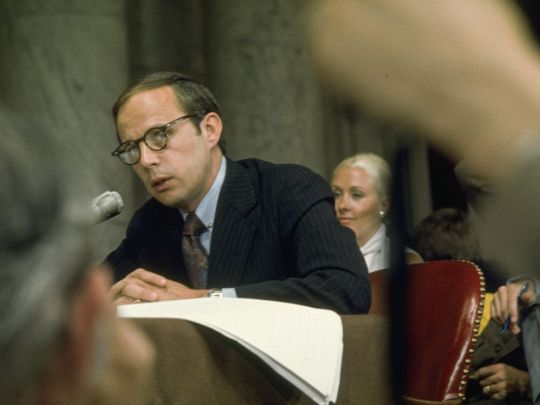
John Dean, presidential adviser and Watergate conspirator, testifies before a Senate committee during the Watergate hearings, circa 1973. | Gjon Mili/LIFE Picture Collection via Getty Images
An administration insider just rolled on the president. We’ve seen this movie before.
Forty-six years ago, President Nixon’s former White House counsel took an oath before a congressional committee and delivered testimony that eventually brought down the president.
On Wednesday, not long after Gordon Sondland, President Trump’s ambassador to the European Union, took a similar oath, journalists and historians alike started comparing Sondland to John Dean, the former Nixon aide who testified nearly half a century ago.
Has Ukraine-gate found its John Dean?
— Ken Dilanian (@KenDilanianNBC) November 20, 2019
Feels like John Dean in 1973
— Julian Zelizer (@julianzelizer) November 20, 2019
Like Dean, Sondland is an administration insider who delivered damning testimony implicating the president in serious wrongdoing. Like Dean, Sondland appears to be a central figure in a scandal.
Dean’s fateful testimony began with a confession. “I was involved in obstructing justice,” he said of his efforts to cover up a botched attempt to break into the Democratic National Committee offices at the Watergate Hotel at the behest of Nixon’s reelection campaign. “I assisted another in perjured testimony. ... I made personal use of funds that were in my custody.”
But Dean also implicated the president, recounting a meeting where he unsuccessfully urged Nixon to stop the coverup and to come clean himself.

Gjon Mili/LIFE Picture Collection via Getty Images
President Nixon’s aide John Dean is sworn in before the Senate committee conducting hearings on the Watergate break-in and the conduct of the Nixon administration, on June 1, 1973.
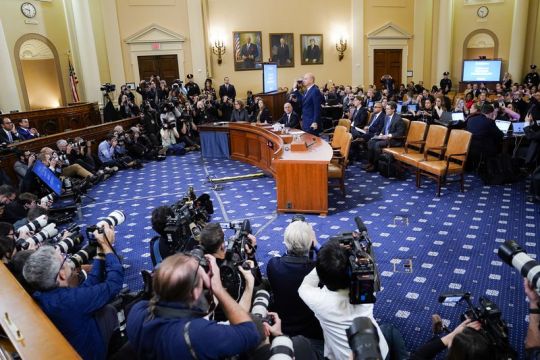
Win McNamee/Getty Images
Gordon Sondland, the US ambassador to the European Union, is sworn in prior to testifying in the impeachment inquiry against US President Donald Trump on November 20, 2019.
Sondland’s testimony on Tuesday, by contrast, was less contrite. In his opening statement to the House Intelligence Committee, Sondland paints himself as a reluctant participant in Trump’s attempt to condition military aid to Ukraine on that country’s willingness to open up an investigation that could damage Democratic presidential candidate Joe Biden. “This security aid was critical to Ukraine’s defense and should not have been delayed,” Sondland told the committee, adding that his “goal” was “to do what was necessary to get the aid released.”
But Sondland’s testimony is, if anything, even more damning than Dean’s. Sondland speaks of two quid pro quo bargains that Trump hoped to strike with Ukraine, the aid-for-an-investigation bargain and a related attempt to trade a White House meeting with Trump for such an investigation.
Trump’s personal lawyer Rudy Giuliani “conveyed to Secretary Perry, Ambassador Volker, and others that President Trump wanted a public statement from President Zelensky committing to investigations of Burisma and the 2016 election,” according to Sondland. “We all understood that these prerequisites for the White House call and White House meeting reflected President Trump’s desires and requirements.”
Yet, while Sondland and Dean resemble each other in that they are political insiders delivering damaging testimony about the president they serve, the Watergate scandal and the Trump Ukraine scandal are playing out in very different ways.
Ultimately, Dean’s testimony proved significant not because he levied accusations about the president but because he speculated — correctly, as it turns out — that Nixon may have recorded damning evidence against himself. Sondland, by contrast, largely confirmed facts we already knew: that Trump sought a quid pro quo arrangement with Ukraine to undercut a political rival.
Who was John Dean?
On the day Dean took his oath before the Senate Watergate Committee, he seemed to be leading a charmed Beltway life. Just 34 years old, Dean had recently finished a nearly three-year stint as counsel to the president of the United States. Contemporary reports of his testimony speak of his expensive suits, his Porsche, and his “beautifully groomed” wife Maureen, who sat behind him during the hearings.
But his career was hardly spotless. He lost his first legal job at a Washington, DC, law firm for allegedly engaging in “unethical conduct” — Dean was accused of competing with one of his own clients for a television station license — although the firm later characterized the reason for his firing as a “basic disagreement over ... the nature and scope of an associate’s activities.”
Dean later described himself as the “desk officer” for the White House coverup of the Watergate break-in. In that role, he shredded incriminating documents and paid hush money to people involved in the break-in.
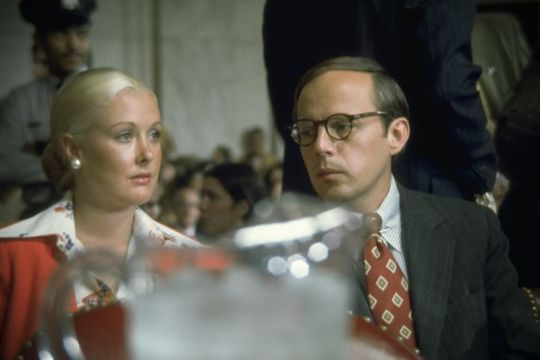
Gjon Mili/LIFE Picture Collection via Getty Images
Nixon aide John Dean and his wife Maureen sit quietly during a break in the Watergate hearings on June 1, 1973.
The most significant portion of Dean’s Watergate testimony, however, involved what happened after he told Nixon that he was no longer comfortable playing this role. Dean famously testified that he told Nixon “that there was a cancer growing on the presidency and that if the cancer was not removed that the president himself would be killed by it.”
During that conversation, Dean told the Watergate Committee, Nixon got up from his chair, walked to a corner of the office, and whispered that he was “probably foolish” to have discussed giving clemency to one of the Watergate burglars. Dean speculated that maybe Nixon moved to another part of the room and whispered because he was recording the conversation and didn’t want this one statement to be picked up by the recorder.
That speculation planted a seed that bore fruit weeks later when Nixon Deputy Chief of Staff Alexander Butterfield testified before the Watergate Committee. Butterfield was asked whether Nixon had a system to record White House conversations and Butterfield testified that such a taping system was installed in the Oval Office.
The Supreme Court eventually ordered Nixon to turn these tapes over to a special prosecutor, and one of the tapes revealed that Nixon discussed using the CIA to obstruct the FBI’s investigation into the Watergate break-in.
Days later, Nixon resigned.

Pierre Manevy/Express/Getty Images
President Richard Nixon announces his resignation on national television, following the Watergate scandal, on August 8, 1974.
Dean served a brief prison term for his own role in Watergate; he was also disbarred. He’s since reemerged as a vocal critic of the kind of corruption that poisoned the Nixon White House. Indeed, he compared the case Special Counsel Robert Mueller laid out against President Trump to the Watergate scandal in June testimony to the House Judiciary Committee.
Is Sondland the new John Dean?
As discussed above, Dean and Sondland do have much in common. It’s not just that they both testified against a president who appointed them to prestigious jobs. Just as Dean was a central figure in the Watergate coverup, Sondland appears to be an important figure in the Ukraine scandal.
Last month, for example, text messages between Sondland and his diplomatic colleagues revealed them discussing the effort to pressure Ukraine into opening a political investigation. In one of those messages, Bill Taylor, the senior US diplomat in Ukraine, tells Sondland, “I think it’s crazy to withhold security assistance for help with a political campaign.”
Sondland, moreover, admitted in his testimony on Wednesday that he told a senior aide to Ukrainian President Volodymyr Zelensky, “I believed that the resumption of US aid would likely not occur until Ukraine took some kind of action on” a public statement about the investigation Trump sought.

Gjon Mili/LIFE Picture Collection/Getty Images
Nixon aide John Dean testifying at Senate hearings on the Watergate break-in, on June 1, 1973.
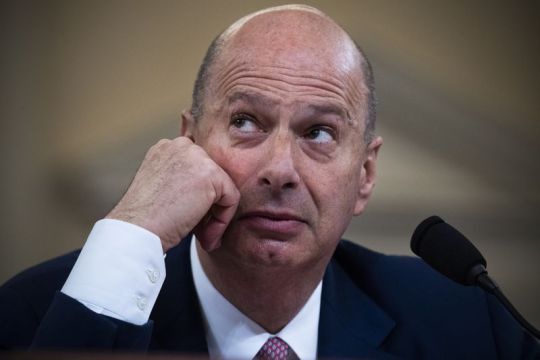
Tom Williams/CQ-Roll Call/Getty Images
Gordon Sondland, US ambassador to the European Union, testifies before the House Intelligence Committee on November 20, 2019.
There is, however, one important way in which Sondland’s testimony differs from Dean’s.
Watergate was, in many ways, like a mystery novel. The hearings gathered evidence and they built toward an uncertain outcome. Dean’s speculation about the Nixon tapes inspired a new line of inquiry from Watergate investigators. That led to Butterfield’s revelation, which ultimately led to the narrative’s denouement: the “smoking gun” tape implicating Nixon in obstruction of justice.
The Ukraine scandal, by contrast, began with a smoking gun. Democrats opened an impeachment inquiry into Trump after the White House released a readout of a phone call where Trump sought a quid pro quo deal with Zelensky. There’s very little mystery surrounding the Trump impeachment hearings. We already know that Trump did it.
Sondland and other witnesses have filled in some blanks. The question now is whether Senate Republicans will do something about it.
from Vox - All https://ift.tt/2O3SvZ2
0 notes
Text
Gordon Sondland is being called the next John Dean. Here’s why.

John Dean, presidential adviser and Watergate conspirator, testifies before a Senate committee during the Watergate hearings, circa 1973. | Gjon Mili/LIFE Picture Collection via Getty Images
An administration insider just rolled on the president. We’ve seen this movie before.
Forty-six years ago, President Nixon’s former White House counsel took an oath before a congressional committee and delivered testimony that eventually brought down the president.
On Wednesday, not long after Gordon Sondland, President Trump’s ambassador to the European Union, took a similar oath, journalists and historians alike started comparing Sondland to John Dean, the former Nixon aide who testified nearly half a century ago.
Has Ukraine-gate found its John Dean?
— Ken Dilanian (@KenDilanianNBC) November 20, 2019
Feels like John Dean in 1973
— Julian Zelizer (@julianzelizer) November 20, 2019
Like Dean, Sondland is an administration insider who delivered damning testimony implicating the president in serious wrongdoing. Like Dean, Sondland appears to be a central figure in a scandal.
Dean’s fateful testimony began with a confession. “I was involved in obstructing justice,” he said of his efforts to cover up a botched attempt to break into the Democratic National Committee offices at the Watergate Hotel at the behest of Nixon’s reelection campaign. “I assisted another in perjured testimony. ... I made personal use of funds that were in my custody.”
But Dean also implicated the president, recounting a meeting where he unsuccessfully urged Nixon to stop the coverup and to come clean himself.
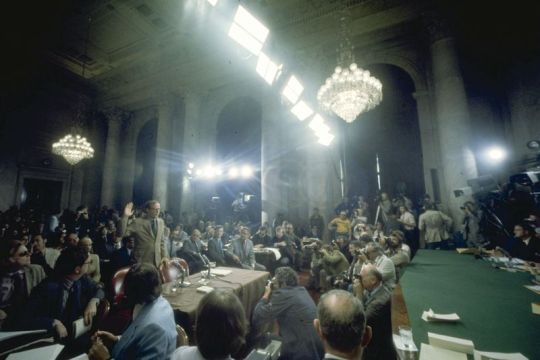
Gjon Mili/LIFE Picture Collection via Getty Images
President Nixon’s aide John Dean is sworn in before the Senate committee conducting hearings on the Watergate break-in and the conduct of the Nixon administration, on June 1, 1973.

Win McNamee/Getty Images
Gordon Sondland, the US ambassador to the European Union, is sworn in prior to testifying in the impeachment inquiry against US President Donald Trump on November 20, 2019.
Sondland’s testimony on Tuesday, by contrast, was less contrite. In his opening statement to the House Intelligence Committee, Sondland paints himself as a reluctant participant in Trump’s attempt to condition military aid to Ukraine on that country’s willingness to open up an investigation that could damage Democratic presidential candidate Joe Biden. “This security aid was critical to Ukraine’s defense and should not have been delayed,” Sondland told the committee, adding that his “goal” was “to do what was necessary to get the aid released.”
But Sondland’s testimony is, if anything, even more damning than Dean’s. Sondland speaks of two quid pro quo bargains that Trump hoped to strike with Ukraine, the aid-for-an-investigation bargain and a related attempt to trade a White House meeting with Trump for such an investigation.
Trump’s personal lawyer Rudy Giuliani “conveyed to Secretary Perry, Ambassador Volker, and others that President Trump wanted a public statement from President Zelensky committing to investigations of Burisma and the 2016 election,” according to Sondland. “We all understood that these prerequisites for the White House call and White House meeting reflected President Trump’s desires and requirements.”
Yet, while Sondland and Dean resemble each other in that they are political insiders delivering damaging testimony about the president they serve, the Watergate scandal and the Trump Ukraine scandal are playing out in very different ways.
Ultimately, Dean’s testimony proved significant not because he levied accusations about the president but because he speculated — correctly, as it turns out — that Nixon may have recorded damning evidence against himself. Sondland, by contrast, largely confirmed facts we already knew: that Trump sought a quid pro quo arrangement with Ukraine to undercut a political rival.
Who was John Dean?
On the day Dean took his oath before the Senate Watergate Committee, he seemed to be leading a charmed Beltway life. Just 34 years old, Dean had recently finished a nearly three-year stint as counsel to the president of the United States. Contemporary reports of his testimony speak of his expensive suits, his Porsche, and his “beautifully groomed” wife Maureen, who sat behind him during the hearings.
But his career was hardly spotless. He lost his first legal job at a Washington, DC, law firm for allegedly engaging in “unethical conduct” — Dean was accused of competing with one of his own clients for a television station license — although the firm later characterized the reason for his firing as a “basic disagreement over ... the nature and scope of an associate’s activities.”
Dean later described himself as the “desk officer” for the White House coverup of the Watergate break-in. In that role, he shredded incriminating documents and paid hush money to people involved in the break-in.

Gjon Mili/LIFE Picture Collection via Getty Images
Nixon aide John Dean and his wife Maureen sit quietly during a break in the Watergate hearings on June 1, 1973.
The most significant portion of Dean’s Watergate testimony, however, involved what happened after he told Nixon that he was no longer comfortable playing this role. Dean famously testified that he told Nixon “that there was a cancer growing on the presidency and that if the cancer was not removed that the president himself would be killed by it.”
During that conversation, Dean told the Watergate Committee, Nixon got up from his chair, walked to a corner of the office, and whispered that he was “probably foolish” to have discussed giving clemency to one of the Watergate burglars. Dean speculated that maybe Nixon moved to another part of the room and whispered because he was recording the conversation and didn’t want this one statement to be picked up by the recorder.
That speculation planted a seed that bore fruit weeks later when Nixon Deputy Chief of Staff Alexander Butterfield testified before the Watergate Committee. Butterfield was asked whether Nixon had a system to record White House conversations and Butterfield testified that such a taping system was installed in the Oval Office.
The Supreme Court eventually ordered Nixon to turn these tapes over to a special prosecutor, and one of the tapes revealed that Nixon discussed using the CIA to obstruct the FBI’s investigation into the Watergate break-in.
Days later, Nixon resigned.
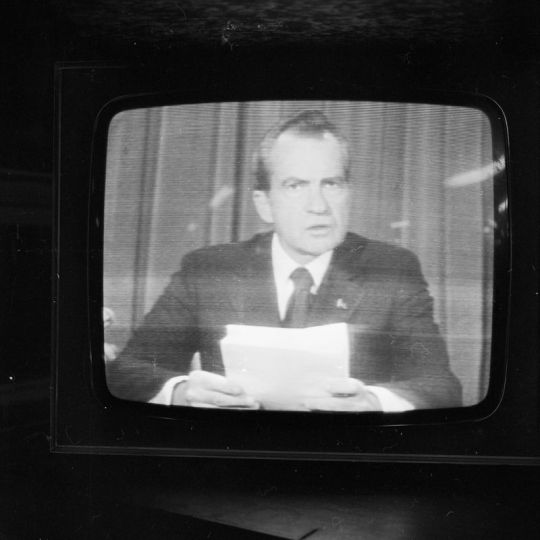
Pierre Manevy/Express/Getty Images
President Richard Nixon announces his resignation on national television, following the Watergate scandal, on August 8, 1974.
Dean served a brief prison term for his own role in Watergate; he was also disbarred. He’s since reemerged as a vocal critic of the kind of corruption that poisoned the Nixon White House. Indeed, he compared the case Special Counsel Robert Mueller laid out against President Trump to the Watergate scandal in June testimony to the House Judiciary Committee.
Is Sondland the new John Dean?
As discussed above, Dean and Sondland do have much in common. It’s not just that they both testified against a president who appointed them to prestigious jobs. Just as Dean was a central figure in the Watergate coverup, Sondland appears to be an important figure in the Ukraine scandal.
Last month, for example, text messages between Sondland and his diplomatic colleagues revealed them discussing the effort to pressure Ukraine into opening a political investigation. In one of those messages, Bill Taylor, the senior US diplomat in Ukraine, tells Sondland, “I think it’s crazy to withhold security assistance for help with a political campaign.”
Sondland, moreover, admitted in his testimony on Wednesday that he told a senior aide to Ukrainian President Volodymyr Zelensky, “I believed that the resumption of US aid would likely not occur until Ukraine took some kind of action on” a public statement about the investigation Trump sought.
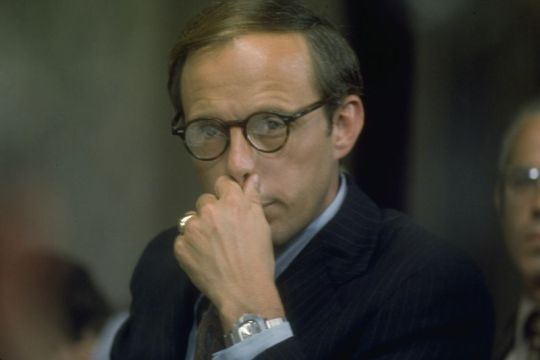
Gjon Mili/LIFE Picture Collection/Getty Images
Nixon aide John Dean testifying at Senate hearings on the Watergate break-in, on June 1, 1973.
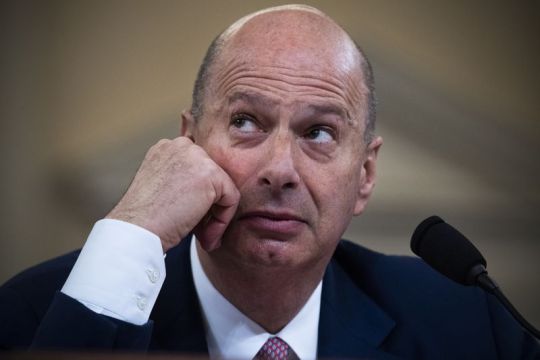
Tom Williams/CQ-Roll Call/Getty Images
Gordon Sondland, US ambassador to the European Union, testifies before the House Intelligence Committee on November 20, 2019.
There is, however, one important way in which Sondland’s testimony differs from Dean’s.
Watergate was, in many ways, like a mystery novel. The hearings gathered evidence and they built toward an uncertain outcome. Dean’s speculation about the Nixon tapes inspired a new line of inquiry from Watergate investigators. That led to Butterfield’s revelation, which ultimately led to the narrative’s denouement: the “smoking gun” tape implicating Nixon in obstruction of justice.
The Ukraine scandal, by contrast, began with a smoking gun. Democrats opened an impeachment inquiry into Trump after the White House released a readout of a phone call where Trump sought a quid pro quo deal with Zelensky. There’s very little mystery surrounding the Trump impeachment hearings. We already know that Trump did it.
Sondland and other witnesses have filled in some blanks. The question now is whether Senate Republicans will do something about it.
from Vox - All https://ift.tt/2O3SvZ2
0 notes
Text
Gordon Sondland is being called the next John Dean. Here’s why.
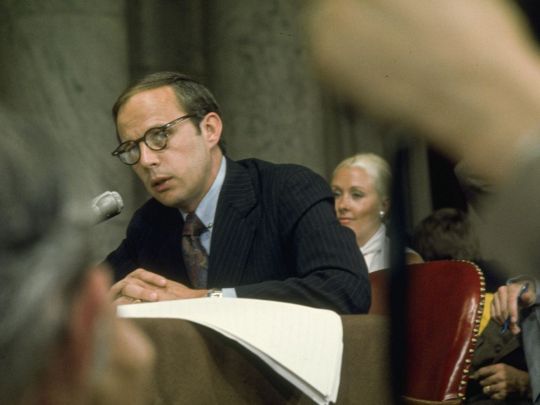
John Dean, presidential adviser and Watergate conspirator, testifies before a Senate committee during the Watergate hearings, circa 1973. | Gjon Mili/LIFE Picture Collection via Getty Images
An administration insider just rolled on the president. We’ve seen this movie before.
Forty-six years ago, President Nixon’s former White House counsel took an oath before a congressional committee and delivered testimony that eventually brought down the president.
On Wednesday, not long after Gordon Sondland, President Trump’s ambassador to the European Union, took a similar oath, journalists and historians alike started comparing Sondland to John Dean, the former Nixon aide who testified nearly half a century ago.
Has Ukraine-gate found its John Dean?
— Ken Dilanian (@KenDilanianNBC) November 20, 2019
Feels like John Dean in 1973
— Julian Zelizer (@julianzelizer) November 20, 2019
Like Dean, Sondland is an administration insider who delivered damning testimony implicating the president in serious wrongdoing. Like Dean, Sondland appears to be a central figure in a scandal.
Dean’s fateful testimony began with a confession. “I was involved in obstructing justice,” he said of his efforts to cover up a botched attempt to break into the Democratic National Committee offices at the Watergate Hotel at the behest of Nixon’s reelection campaign. “I assisted another in perjured testimony. ... I made personal use of funds that were in my custody.”
But Dean also implicated the president, recounting a meeting where he unsuccessfully urged Nixon to stop the coverup and to come clean himself.

Gjon Mili/LIFE Picture Collection via Getty Images
President Nixon’s aide John Dean is sworn in before the Senate committee conducting hearings on the Watergate break-in and the conduct of the Nixon administration, on June 1, 1973.

Win McNamee/Getty Images
Gordon Sondland, the US ambassador to the European Union, is sworn in prior to testifying in the impeachment inquiry against US President Donald Trump on November 20, 2019.
Sondland’s testimony on Tuesday, by contrast, was less contrite. In his opening statement to the House Intelligence Committee, Sondland paints himself as a reluctant participant in Trump’s attempt to condition military aid to Ukraine on that country’s willingness to open up an investigation that could damage Democratic presidential candidate Joe Biden. “This security aid was critical to Ukraine’s defense and should not have been delayed,” Sondland told the committee, adding that his “goal” was “to do what was necessary to get the aid released.”
But Sondland’s testimony is, if anything, even more damning than Dean’s. Sondland speaks of two quid pro quo bargains that Trump hoped to strike with Ukraine, the aid-for-an-investigation bargain and a related attempt to trade a White House meeting with Trump for such an investigation.
Trump’s personal lawyer Rudy Giuliani “conveyed to Secretary Perry, Ambassador Volker, and others that President Trump wanted a public statement from President Zelensky committing to investigations of Burisma and the 2016 election,” according to Sondland. “We all understood that these prerequisites for the White House call and White House meeting reflected President Trump’s desires and requirements.”
Yet, while Sondland and Dean resemble each other in that they are political insiders delivering damaging testimony about the president they serve, the Watergate scandal and the Trump Ukraine scandal are playing out in very different ways.
Ultimately, Dean’s testimony proved significant not because he levied accusations about the president but because he speculated — correctly, as it turns out — that Nixon may have recorded damning evidence against himself. Sondland, by contrast, largely confirmed facts we already knew: that Trump sought a quid pro quo arrangement with Ukraine to undercut a political rival.
Who was John Dean?
On the day Dean took his oath before the Senate Watergate Committee, he seemed to be leading a charmed Beltway life. Just 34 years old, Dean had recently finished a nearly three-year stint as counsel to the president of the United States. Contemporary reports of his testimony speak of his expensive suits, his Porsche, and his “beautifully groomed” wife Maureen, who sat behind him during the hearings.
But his career was hardly spotless. He lost his first legal job at a Washington, DC, law firm for allegedly engaging in “unethical conduct” — Dean was accused of competing with one of his own clients for a television station license — although the firm later characterized the reason for his firing as a “basic disagreement over ... the nature and scope of an associate’s activities.”
Dean later described himself as the “desk officer” for the White House coverup of the Watergate break-in. In that role, he shredded incriminating documents and paid hush money to people involved in the break-in.

Gjon Mili/LIFE Picture Collection via Getty Images
Nixon aide John Dean and his wife Maureen sit quietly during a break in the Watergate hearings on June 1, 1973.
The most significant portion of Dean’s Watergate testimony, however, involved what happened after he told Nixon that he was no longer comfortable playing this role. Dean famously testified that he told Nixon “that there was a cancer growing on the presidency and that if the cancer was not removed that the president himself would be killed by it.”
During that conversation, Dean told the Watergate Committee, Nixon got up from his chair, walked to a corner of the office, and whispered that he was “probably foolish” to have discussed giving clemency to one of the Watergate burglars. Dean speculated that maybe Nixon moved to another part of the room and whispered because he was recording the conversation and didn’t want this one statement to be picked up by the recorder.
That speculation planted a seed that bore fruit weeks later when Nixon Deputy Chief of Staff Alexander Butterfield testified before the Watergate Committee. Butterfield was asked whether Nixon had a system to record White House conversations and Butterfield testified that such a taping system was installed in the Oval Office.
The Supreme Court eventually ordered Nixon to turn these tapes over to a special prosecutor, and one of the tapes revealed that Nixon discussed using the CIA to obstruct the FBI’s investigation into the Watergate break-in.
Days later, Nixon resigned.
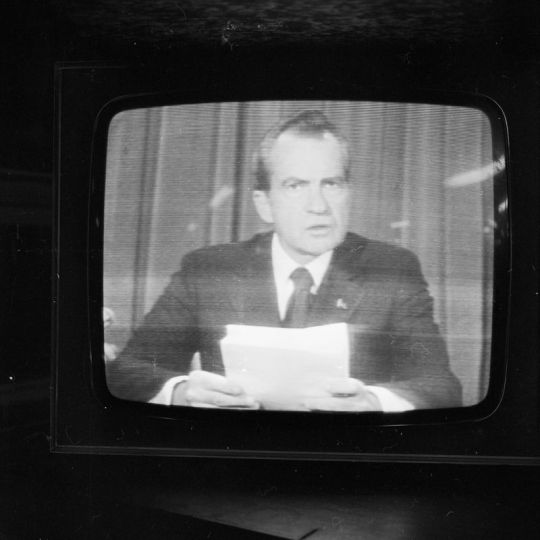
Pierre Manevy/Express/Getty Images
President Richard Nixon announces his resignation on national television, following the Watergate scandal, on August 8, 1974.
Dean served a brief prison term for his own role in Watergate; he was also disbarred. He’s since reemerged as a vocal critic of the kind of corruption that poisoned the Nixon White House. Indeed, he compared the case Special Counsel Robert Mueller laid out against President Trump to the Watergate scandal in June testimony to the House Judiciary Committee.
Is Sondland the new John Dean?
As discussed above, Dean and Sondland do have much in common. It’s not just that they both testified against a president who appointed them to prestigious jobs. Just as Dean was a central figure in the Watergate coverup, Sondland appears to be an important figure in the Ukraine scandal.
Last month, for example, text messages between Sondland and his diplomatic colleagues revealed them discussing the effort to pressure Ukraine into opening a political investigation. In one of those messages, Bill Taylor, the senior US diplomat in Ukraine, tells Sondland, “I think it’s crazy to withhold security assistance for help with a political campaign.”
Sondland, moreover, admitted in his testimony on Wednesday that he told a senior aide to Ukrainian President Volodymyr Zelensky, “I believed that the resumption of US aid would likely not occur until Ukraine took some kind of action on” a public statement about the investigation Trump sought.
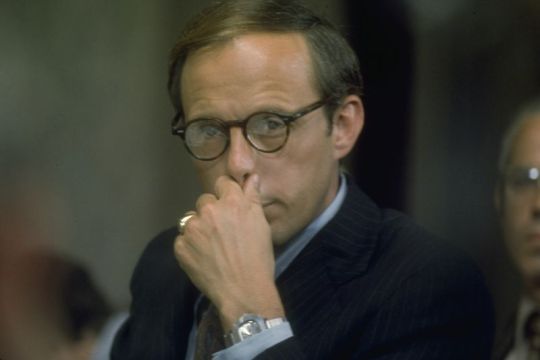
Gjon Mili/LIFE Picture Collection/Getty Images
Nixon aide John Dean testifying at Senate hearings on the Watergate break-in, on June 1, 1973.
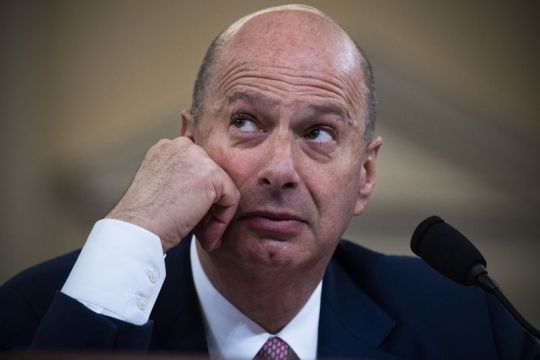
Tom Williams/CQ-Roll Call/Getty Images
Gordon Sondland, US ambassador to the European Union, testifies before the House Intelligence Committee on November 20, 2019.
There is, however, one important way in which Sondland’s testimony differs from Dean’s.
Watergate was, in many ways, like a mystery novel. The hearings gathered evidence and they built toward an uncertain outcome. Dean’s speculation about the Nixon tapes inspired a new line of inquiry from Watergate investigators. That led to Butterfield’s revelation, which ultimately led to the narrative’s denouement: the “smoking gun” tape implicating Nixon in obstruction of justice.
The Ukraine scandal, by contrast, began with a smoking gun. Democrats opened an impeachment inquiry into Trump after the White House released a readout of a phone call where Trump sought a quid pro quo deal with Zelensky. There’s very little mystery surrounding the Trump impeachment hearings. We already know that Trump did it.
Sondland and other witnesses have filled in some blanks. The question now is whether Senate Republicans will do something about it.
from Vox - All https://ift.tt/2O3SvZ2
0 notes
Text
Gordon Sondland is being called the next John Dean. Here’s why.
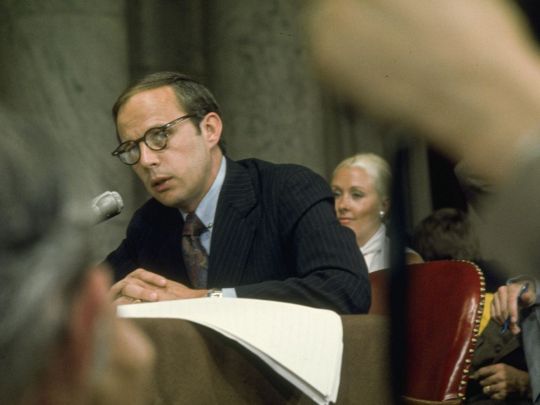
John Dean, presidential adviser and Watergate conspirator, testifies before a Senate committee during the Watergate hearings, circa 1973. | Gjon Mili/LIFE Picture Collection via Getty Images
An administration insider just rolled on the president. We’ve seen this movie before.
Forty-six years ago, President Nixon’s former White House counsel took an oath before a congressional committee and delivered testimony that eventually brought down the president.
On Wednesday, not long after Gordon Sondland, President Trump’s ambassador to the European Union, took a similar oath, journalists and historians alike started comparing Sondland to John Dean, the former Nixon aide who testified nearly half a century ago.
Has Ukraine-gate found its John Dean?
— Ken Dilanian (@KenDilanianNBC) November 20, 2019
Feels like John Dean in 1973
— Julian Zelizer (@julianzelizer) November 20, 2019
Like Dean, Sondland is an administration insider who delivered damning testimony implicating the president in serious wrongdoing. Like Dean, Sondland appears to be a central figure in a scandal.
Dean’s fateful testimony began with a confession. “I was involved in obstructing justice,” he said of his efforts to cover up a botched attempt to break into the Democratic National Committee offices at the Watergate Hotel at the behest of Nixon’s reelection campaign. “I assisted another in perjured testimony. ... I made personal use of funds that were in my custody.”
But Dean also implicated the president, recounting a meeting where he unsuccessfully urged Nixon to stop the coverup and to come clean himself.

Gjon Mili/LIFE Picture Collection via Getty Images
President Nixon’s aide John Dean is sworn in before the Senate committee conducting hearings on the Watergate break-in and the conduct of the Nixon administration, on June 1, 1973.
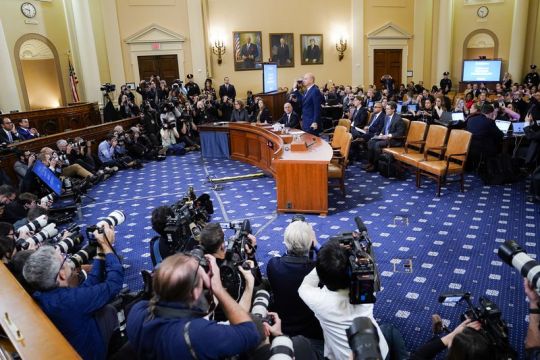
Win McNamee/Getty Images
Gordon Sondland, the US ambassador to the European Union, is sworn in prior to testifying in the impeachment inquiry against US President Donald Trump on November 20, 2019.
Sondland’s testimony on Tuesday, by contrast, was less contrite. In his opening statement to the House Intelligence Committee, Sondland paints himself as a reluctant participant in Trump’s attempt to condition military aid to Ukraine on that country’s willingness to open up an investigation that could damage Democratic presidential candidate Joe Biden. “This security aid was critical to Ukraine’s defense and should not have been delayed,” Sondland told the committee, adding that his “goal” was “to do what was necessary to get the aid released.”
But Sondland’s testimony is, if anything, even more damning than Dean’s. Sondland speaks of two quid pro quo bargains that Trump hoped to strike with Ukraine, the aid-for-an-investigation bargain and a related attempt to trade a White House meeting with Trump for such an investigation.
Trump’s personal lawyer Rudy Giuliani “conveyed to Secretary Perry, Ambassador Volker, and others that President Trump wanted a public statement from President Zelensky committing to investigations of Burisma and the 2016 election,” according to Sondland. “We all understood that these prerequisites for the White House call and White House meeting reflected President Trump’s desires and requirements.”
Yet, while Sondland and Dean resemble each other in that they are political insiders delivering damaging testimony about the president they serve, the Watergate scandal and the Trump Ukraine scandal are playing out in very different ways.
Ultimately, Dean’s testimony proved significant not because he levied accusations about the president but because he speculated — correctly, as it turns out — that Nixon may have recorded damning evidence against himself. Sondland, by contrast, largely confirmed facts we already knew: that Trump sought a quid pro quo arrangement with Ukraine to undercut a political rival.
Who was John Dean?
On the day Dean took his oath before the Senate Watergate Committee, he seemed to be leading a charmed Beltway life. Just 34 years old, Dean had recently finished a nearly three-year stint as counsel to the president of the United States. Contemporary reports of his testimony speak of his expensive suits, his Porsche, and his “beautifully groomed” wife Maureen, who sat behind him during the hearings.
But his career was hardly spotless. He lost his first legal job at a Washington, DC, law firm for allegedly engaging in “unethical conduct” — Dean was accused of competing with one of his own clients for a television station license — although the firm later characterized the reason for his firing as a “basic disagreement over ... the nature and scope of an associate’s activities.”
Dean later described himself as the “desk officer” for the White House coverup of the Watergate break-in. In that role, he shredded incriminating documents and paid hush money to people involved in the break-in.
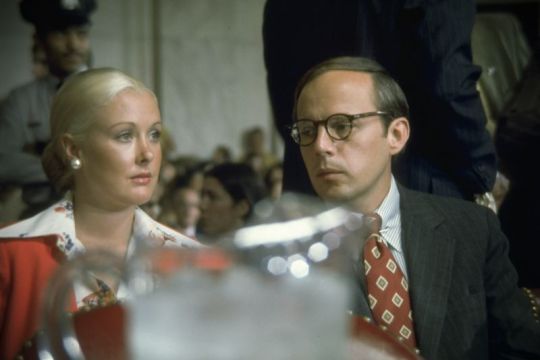
Gjon Mili/LIFE Picture Collection via Getty Images
Nixon aide John Dean and his wife Maureen sit quietly during a break in the Watergate hearings on June 1, 1973.
The most significant portion of Dean’s Watergate testimony, however, involved what happened after he told Nixon that he was no longer comfortable playing this role. Dean famously testified that he told Nixon “that there was a cancer growing on the presidency and that if the cancer was not removed that the president himself would be killed by it.”
During that conversation, Dean told the Watergate Committee, Nixon got up from his chair, walked to a corner of the office, and whispered that he was “probably foolish” to have discussed giving clemency to one of the Watergate burglars. Dean speculated that maybe Nixon moved to another part of the room and whispered because he was recording the conversation and didn’t want this one statement to be picked up by the recorder.
That speculation planted a seed that bore fruit weeks later when Nixon Deputy Chief of Staff Alexander Butterfield testified before the Watergate Committee. Butterfield was asked whether Nixon had a system to record White House conversations and Butterfield testified that such a taping system was installed in the Oval Office.
The Supreme Court eventually ordered Nixon to turn these tapes over to a special prosecutor, and one of the tapes revealed that Nixon discussed using the CIA to obstruct the FBI’s investigation into the Watergate break-in.
Days later, Nixon resigned.
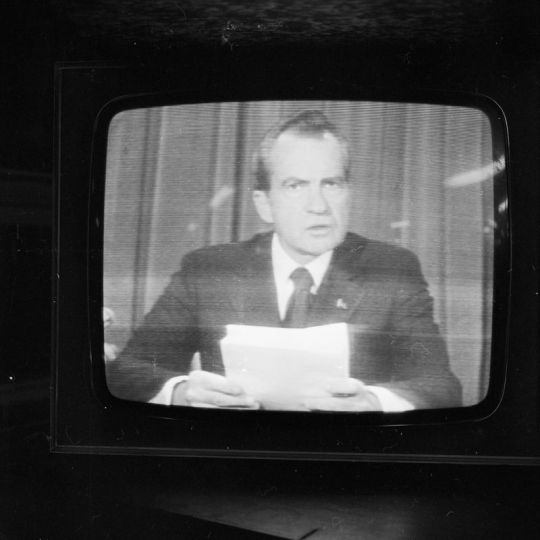
Pierre Manevy/Express/Getty Images
President Richard Nixon announces his resignation on national television, following the Watergate scandal, on August 8, 1974.
Dean served a brief prison term for his own role in Watergate; he was also disbarred. He’s since reemerged as a vocal critic of the kind of corruption that poisoned the Nixon White House. Indeed, he compared the case Special Counsel Robert Mueller laid out against President Trump to the Watergate scandal in June testimony to the House Judiciary Committee.
Is Sondland the new John Dean?
As discussed above, Dean and Sondland do have much in common. It’s not just that they both testified against a president who appointed them to prestigious jobs. Just as Dean was a central figure in the Watergate coverup, Sondland appears to be an important figure in the Ukraine scandal.
Last month, for example, text messages between Sondland and his diplomatic colleagues revealed them discussing the effort to pressure Ukraine into opening a political investigation. In one of those messages, Bill Taylor, the senior US diplomat in Ukraine, tells Sondland, “I think it’s crazy to withhold security assistance for help with a political campaign.”
Sondland, moreover, admitted in his testimony on Wednesday that he told a senior aide to Ukrainian President Volodymyr Zelensky, “I believed that the resumption of US aid would likely not occur until Ukraine took some kind of action on” a public statement about the investigation Trump sought.

Gjon Mili/LIFE Picture Collection/Getty Images
Nixon aide John Dean testifying at Senate hearings on the Watergate break-in, on June 1, 1973.
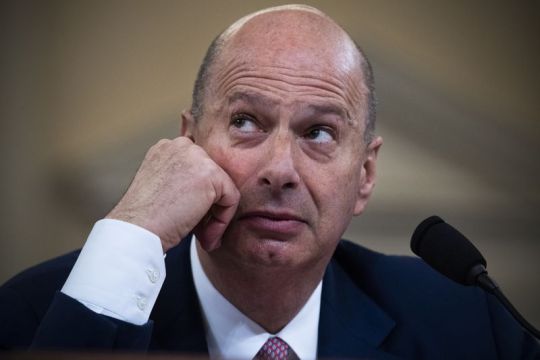
Tom Williams/CQ-Roll Call/Getty Images
Gordon Sondland, US ambassador to the European Union, testifies before the House Intelligence Committee on November 20, 2019.
There is, however, one important way in which Sondland’s testimony differs from Dean’s.
Watergate was, in many ways, like a mystery novel. The hearings gathered evidence and they built toward an uncertain outcome. Dean’s speculation about the Nixon tapes inspired a new line of inquiry from Watergate investigators. That led to Butterfield’s revelation, which ultimately led to the narrative’s denouement: the “smoking gun” tape implicating Nixon in obstruction of justice.
The Ukraine scandal, by contrast, began with a smoking gun. Democrats opened an impeachment inquiry into Trump after the White House released a readout of a phone call where Trump sought a quid pro quo deal with Zelensky. There’s very little mystery surrounding the Trump impeachment hearings. We already know that Trump did it.
Sondland and other witnesses have filled in some blanks. The question now is whether Senate Republicans will do something about it.
from Vox - All https://ift.tt/2O3SvZ2
0 notes
Text
“I’m no CROOK!”
“You must pursue this investigation of Watergate even if it leads to the President. I’m innocent. You’ve got to believe I’m innocent. If you don’t, take my job.” Richard M. Nixon
The Watergate scandal was a major political outrage that took place in the United States during the years 1972- 1974. It was documented that five men broke into the Democratic National Committee (DNC) headquarters at the Watergate Office Complex in Washington D.C. They were found with cash, a slush fund and tape wires. Many persons believed that they were looking for cash but in reality, they went for political and top-secret documents to aid President Nixon with his campaign. Most of us had no prior knowledge of this topic when first hearing about it. But as we continued to read on it, it became astonishing how untrustworthy some presidents can be. This scandal seems to be quite similar to a certain president that feels we should build a wall and keep certain people out, but this isn’t about him. This is just another example on how people of status and power take things for granted and do things that they knowingly won’t get punished for.
When you hear the word leader, you probably think guidance, taking charge, doing what’s right for others… TRUTHFUL. Nixon wasn’t in this situation, he even went as far as tape-recording private conversations and wiretapping the DNC headquarters. He then tried to cover up the crime and its evidence, and when asked about it he denied it instead of coming clean. But unfortunately for him the investigation continued. “The tapes revealed several crucial conversations that took place between the president and his counsel, John Dean, on March 21, 1973. In this conversation, Dean summarized many aspects of the Watergate case, and focused on the subsequent cover-up, describing it as a “cancer on the presidency.”” To make this scandal more interesting, multiple exploitations of power by Nixon’s own administration, commenced an impeachment process against him and his resignation. 69 people were also impeached and the trials resulted in 48 people being found guilty.
Nixon finally proclaimed his resignation and Congress abandoned his impeachment proceedings. At the time, Vice President, Gerald Ford delivered an absolute pardon of Nixon. He overlooked everything he did or was rumored to have been taken part in the scandal. He went as far as doing an interview on television and insisted that Nixon had the best interest of the United States at that time. He proclaimed his innocence until his death in the year 1994. His final, official response was that he “was wrong in not acting more decisively and more forthrightly in dealing with Watergate, particularly when it reached to the point of judicial proceedings.”
2 / 2
In the end, it opened our eyes to the amount of trust and faith we put into our Presidents. As citizens that is our job. They are the head of the country and their purpose is to lead us and the country in a way that we all may become enhanced. This scandal plays a big part in most political scandals that we are facing today with the newly elected, President Trump. He seems to make many decisions that are questionable in many people’s eyes. Why is it that history has a way of repeating itself? Or better yet why do we allow ourselves to be okay with the things these “leaders” do?
Group 4: Reine Mckinney, Monica Merchan, Almah Calixte, Natalie Ceballos, Tianna Ferguson, George Corchado, Tyler Chadwick
0 notes